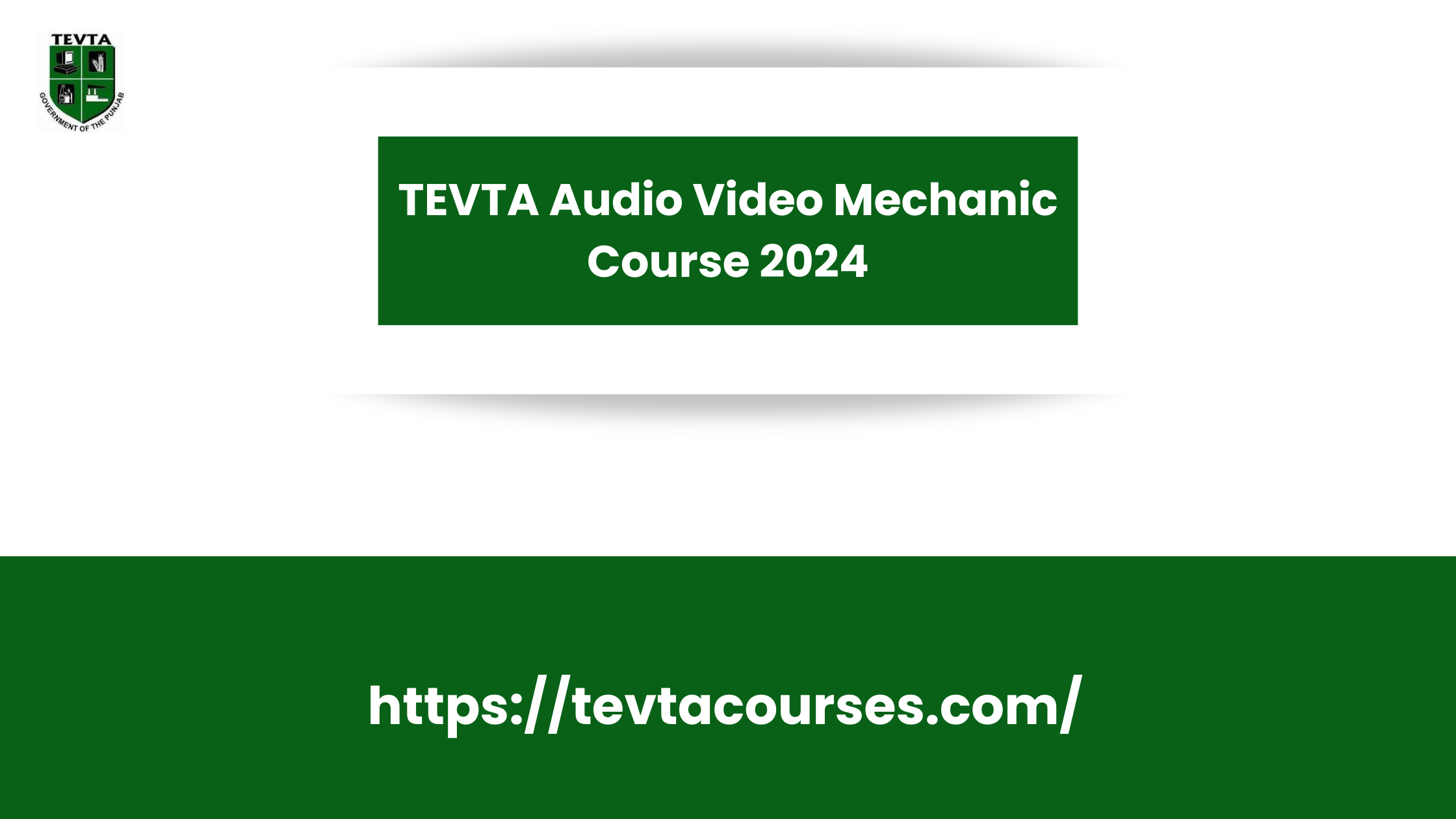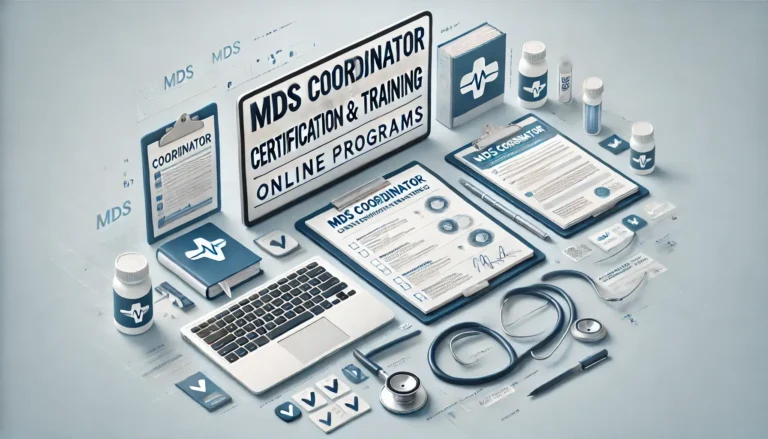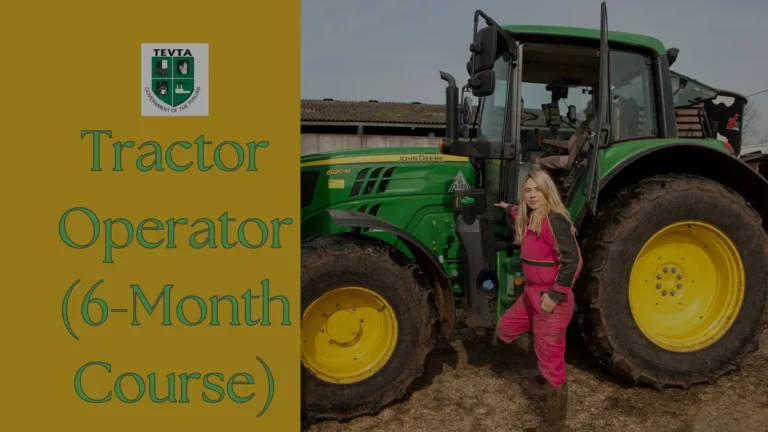TEVTA Audio Video Mechanic Course
TEVTA Audio Video Mechanic Course 2025 aims to help candidates acquire theoretical knowledge and practical skills in electrical electronics/and audio video equipment. So that he can start his career as an audio-video mechanic, and earn his livelihood by repairing audio.
TEVTA Courses will provide you audio video equipment and you will be fully taught about this course. With the help of this, you will be able to make the best decision for your future. If you are interested in this course, then study the following information carefully.
Upon completion of TEVTA Audio Video Mechanic Course 2025, the trainee should have learned the following:
- Basic Electricity and Electronics
- Radio Component and Electronic devices
- Power Supplies
- Radio Receiver (A.M)
- Audio Power Amplifiers
- Servo Control System in Audio and Video Equipment
- Video Cassette Recorder / Playing VCD and DVD
- Television Camera (V.H.S)
- Television Receiver
Also see: UCC Summer Courses 2024
Details About TEVTA Audio Video Mechanic Course 2025
- Entry Level: Matric
- Duration of Course: 6 Months
- Total Training Hours: 360 Hours
- Training Schedule: 15 Hours/Week (3 Hours a Day)
- Training Methodology: 90% Practical, 10% Theory
Skills Proficiency Details
On completion of the TEVTA Audio Video Mechanic Course 2025, the trainee will be able to perform the following tasks:
- Observe safety rules while working on electrical appliances and prevent himself and others from electrical shock.
- Use electronic test equipment safely and accurately.
- Test electronic components and devices.
- Solder joints expertly.
- Assemble power supply, radio receiver, and amplifiers.
- Find faults in radio amplifiers and tape recorders.
- Remove faults in the radio, amplifier, and tape recorders.
- Find faults in video equipment (VCP/VCR, VCD/DVD, TV, Camera, Television).
- Remove faults in VCP/VCR, VCD/DVD, TV, and Camera.
- Undertake repair of Television.
Knowledge Proficiency Details For TEVTA Audio Video Mechanic Course 2025
On completion of this course, a trainee will acquire the following knowledge:
- Basic knowledge about electricity, rules, units, and safety precautions.
- Use, care, and maintenance of electronics mechanic tools and measurement/test equipment.
- Working of radio components (resistor, capacitor, inductor, transformer, diode, transistor).
- Basic electronic theory and introduction to transistors and integrated circuits.
- Essential functions of power supply for radio and amplifier with the help of block diagrams.
- Basic Mechanism of Video Cassette Recording, Playing, and Principles.
- Basic knowledge of VCD and DVD.
- Principle of operating video cameras.
- Basic knowledge of servo control systems in Audio/Video recording.
- Explanation of the function of each part of B/W & Color TV.
- Fault finding and troubleshooting in radio, amplifier, VCP/VCR, VCD, DVD, Cameras, and Television.
Also see: Cecil College Summer Courses 2024
Scheme of Studies TEVTA Audio Video Mechanic Course 2025
(Audio Video Mechanic-6 Months Course)
| Sr. No | Topics | Training (Hrs for Theory) | Training (Hrs for Practical) |
| 1 | Basic Electricity and Electronics | 7 | 20 |
| 2 | Power Supply | 3 | 20 |
| 3 | Amplifier | 4 | 30 |
| 4 | Radio Receiver | 4 | 30 |
| 5 | Television | 5 | 110 |
| 6 | Video Cassette Player/Video Cassette Recorder VCP/VCR | 3 | 30 |
| 7 | Servo Control System in Audio/Video Recorder | 8 | 40 |
| 8 | Video Camera | 2 | 20 |
| 9 | Video Compact Disk VCD | 1 | 12 |
| 10 | Digital Video Display DVD | 1 | 10 |
| Total | 38 hrs | 322 hrs |
DETAIL OF COURSE CONTENTS
(Theory)
- Basic Electricity/Electronics
- Atomic Structure & Practical
- Force Between Equal & Opposite Charge
- Electrical Quantities & Units
- Generation of EMF
- Direction of Current
- Conductor & Insulator
- Types of Material
- Application of Conductor and Insulator
- Resistance and its Unit
- Resistance Depending on Material, Length, and Cross Section
- Material for Resistance
- Specific Resistance
- Color Code of Resistor
- Resistance in AC and DC Circuits
- Ohm’s Law
- Definition
- Relation Between I, V, & R
- Series & Parallel Circuit
- Current and Voltage in Series & Parallel Circuit
- Constant and Variable Voltage Divider
- Load and No Load Characteristic
- Capacitor & Coil
- Definition of Capacitance & Inductance
- Types of Capacitors & Inductors
- The capacitor in AC & DC Circuit
- A coil in AC & DC Circuit
- RLC Circuit
- Impedance Z
- Self Induction / Mutual Induction
- Direction & Magnitude of Self Induction Voltage
- Transformer
- Construction & Working Principle
- Transformation of Voltage, Current, and Impedance
- Semiconductor (Diode)
- N & P Types Semiconductor Material
- Diode Construction
- Diode in AC & DC Circuit
- Power Supply
- Rectification, Full Wave Rectification, Half Wave & Full Wave
- Center Tape Type and Bridge Type Rectifier Circuit
- RC & LC Filter Circuit
- Introduction to Switch Mode Power Supply
- Block Diagram
- Function of Switch Mode Power Supply
- Type of Switch Mode Power Supply
- Zener Diode
- Characteristic Curve & Zener Effect & Operating Range
- Need for Series Resistance
- Voltage Stabilization
- Zener as a Regulator
- Block Diagram of Regulator
- Transistor
- BJT + FET
- Construction
- Biasing (Input/Output & Control)
- Characteristics Curve
- Transistor as Switch
- Transistor as Amplifier
- Common Base, Common Emitter & Common Collector Configuration
- Adjustment and Stabilization of Operation
- Introduction of FET and Working Principle
- Classification of Amplifier
- Feedback in Amplifier Circuit
- Coupling of Multi-stage Amplifier
- Push-Pull Amplifier Circuit & Function
Also see: County College of morris summer courses 2024
- Radio Receiver
- Basic Operation with the Help of Basic Oscillating Circuit
- The Components of an Oscillator Circuit
- Feedback, Amplitude & Condition of Phase
- Type of Oscillators
- Multivibrator
- Principle of Radio Transmitting and Receiving
- Working Principle of Different Stages and Signal Transmission
- Principle of Super Heterodyne Receiver
- Block Diagram
- Working Principle
- Quality of a Good Receiver
- Television
- Types of Picture Tubes & Setup Adjustments
- Scanning and Synchronizing
- RF Tuners & Remote Operation
- Sound Signal Processing
- Video Signal Processing
- Video Signal Flow
- Block Diagram B&W TV
- Block Diagram of Color TV
- Servicing Techniques
- Safety Measures
- Reading Service Manuals
- Signal Tracing
- Finding Defective Components
- Removing/Replacing Defective Components
- Final Adjustment & Performance Tests
- Video Cassette Player (VCP) / Video Cassette Recorder (VCR)
- Video Signal Processing
- Audio Signal Processing
- Luminance Signal Modulation
- Block Diagram
- Servo Control System
- Rotary Head Drum Assembly
- Head Switching in Playback
- Four Head Machines
- Scanner Servo System
- Speed Servo Loop
- Phase Servo Loop
- Timing Comparator
- Control Track & Capstone Servo System
- CTL Pulse
- Capstone Servo System
- Tracing for Playback
- Multi-Speed Operation (SP, LP)
- Frequencies in Servo Control System
- CTL (Control)
- FG (Frequency Generation)
- CTP (Cylinder Track Pulses)
- Higher Definition Recording System
- Hi.Fi Stereo
- Super VHS or S-VHS
- Video Cameras
- Working Principles of Video Cameras
- Camera Tube Types
- Photo Electric Effects
- Image Storage Principle
- Electron Scanning Beam
- Video Signal Encoding
- Pickup Devices Evaluation
- Monochrome TV Camera (Block)
- Color Camera
- Types of Color Camera
- Video Compact Disk (VCD)
- VCD Storage System Block Diagram
- Optical Disk Mechanism
- Modulation Techniques
- Optical Playback System Block Diagram
- Digital Video Display (DVD)
- DVD Disk Specifications
- Multi Aspect Ratio
- Optical Playback System
- Language Options
- DVD Picture Quality
- DVD ROMS
LIST OF EXPERIMENTS
| Sr. No | Topic | Duration (In Hours) |
| 1 | Use of Volt & Ampere Meter | 1 |
| 2 | Use of Oscilloscope | 1 |
| 3 | Resistance Measurement & Color Code Identification | 1 |
| 4 | Testing Capacitor | 1 |
| 5 | Testing Inductor | 1 |
| 6 | Testing Transformer | 1 |
| 7 | Testing Diode | 1 |
| 8 | Testing Zener Diode | 1 |
| 9 | Testing Transistor | 2 |
| 10 | Testing Switch Mode Power Supply | 2 |
| 11 | Rectifier Circuit Testing | 1 |
| 12 | Capacitor Circuit Testing | 1 |
| 13 | Inductor Circuit Testing | 1 |
| 14 | Multi Vibrator Circuit | 2 |
| 15 | AM Radio Receiver Testing | 2 |
| 16 | FM Radio Receiver Testing | 2 |
| 17 | BJT Transistor Testing | 2 |
| 18 | FET Transistor Testing | 2 |
| 19 | Function of Various Radio Components | 3 |
| 20 | Identifying Faulty Components in Radio Receiver | 3 |
| 21 | Identifying Faulty Components in Amplifier | 3 |
| 22 | Servo Control System Components Testing | 2 |
| 23 | Video Signal Processing System Testing | 2 |
| 24 | TV Receiver Component Testing | 4 |
| 25 | Identifying Faulty Components in TV Receivers | 4 |
| 26 | Video Cassette Recorder Testing | 3 |
| 27 | Video Cassette Player Testing | 3 |
| 28 | Identifying Faulty Components in Video Cassette Player | 3 |
| 29 | VCD Component Testing | 3 |
| 30 | DVD Component Testing | 3 |
| Total | 66 Hours |
Criteria For TEVTA Audio Video Mechanic Course 2025
The assessment of candidates should be based on the following:
- Class Attendance
- Class Participation
- Practical Skills
- Theory Test Results
- Assignments
- Final Practical Examination
- Final Theory Examination







